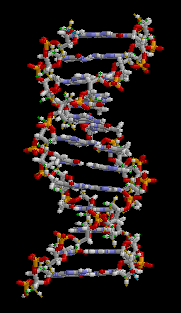The name Francis Crick will forever be associated with the discovery of the double helix of the DNA molecule. Indeed, he co-won a Nobel Prize for that particular insight. Of course I didn’t learn about Crick when I was growing up—we weren’t an educated family. I first learned about him in college when his book Of Molecules and Men was required reading for one of our religion classes. This book is highly critical of religion, and Christianity in particular. We read it not to assent to his logic, but rather to have it picked apart in class. (Grove City was a conservative Christian college then, but less so than it is today.) Although it has been over three decades since I’ve read it (I found my copy again when we moved three years ago) the sharp critique has remained. Crick was a staunch materialist.
 Image credit: brian0918, via Wikimedia Commons
Image credit: brian0918, via Wikimedia Commons
Although I appreciated his contribution to science, I really didn’t have too much cause to think about Crick after that. I’m not a geneticist and there are certainly a lot of people out there who make sharp criticisms against religion. What brought Crick back to mind was when I recently read that he had later come to the conclusion that human DNA was too complex to have evolved by chance. The piece I was reading used the unfortunate term “intelligent design” so I had to follow up. Francis Crick hadn’t become a Fundamentalist, had he? No, it turns out. Crick had come to believe in “directed panspermia.” Panspermia is the concept that life isn’t isolated on earth—it exists in space and was brought to our planet by space dust, or some such means. The “directed” part was what caught my attention.
For a vocal critic of religion, Crick had come to believe that extraterrestrial intelligences had engineered at least human DNA. This is of particular consequence because until recently the idea of extraterrestrial intelligent life was a laughing flashpoint among scientists and skeptics. In fact, it’s still regularly labelled as “paranormal.” I was surprised to learn that a scientist of Crick’s stature had come to this conclusion while being so utterly critical of religion. Of course, views can change over a lifetime. No one is born with all the correct knowledge. It is interesting that Crick believed human DNA to require some outside intervention to become what it is. Some religious believers share this outlook, but with quite a different origin source in mind. It just seems to me that our collegiate discussion of his work seems to have been woefully incomplete.
